Norman Toby Simms, 1940 -2022
Norman Toby Simms, 1940 -2022
By Richard Swainson
In 1986, after a year battling cancer, Norman Simms returned to the lecture theatres of Waikato University. He taught an A-semester course on 18th century literature.
Norman's lectures had a formal rigour to them that went beyond what one was usually exposed to at undergraduate level. They required and rewarded full attention. The text at hand was a starting point and was always thoroughly examined but he offered so much more. Historical context, both general and immediate, witty asides and allusions that were often blackly humorous, at times funny yet also deeply disturbing and a certain indefinable intellectual quality that bespoke reflection and scholarship and personal investment in the material. One lecture in particular, on Jonathan Swift's Gulliver's Travels and the nature of satire, continues to resonate in the mind some 36 years later. Norman's capacity to draw parallels between the horrors witnessed by Swift and reshaped by his pen and those more contemporary to our own times, particularly the Holocaust, had an impact that transcended the narrow confines of a second-year English course.
Norman Simms was a giant. In a six-decade career he published upwards of 400 articles, reviews, pamphlets and books. He wrote one book per year after his retirement, putting the finishing touches on his last even as his energy was sapped by terminal illness. He was also a poet and essayist who wrote extensively about his own life and experiences, employing the same satirical technique of which he spoke so eloquently.
Norman Toby Simms was born 4 July 1940 in Brooklyn, New York, the son of Louis Simms, a dentist and captain in the United States Army during World War II and Claire Simms (nee Herman), a former concert pianist. Norman's parents were both children of first-generation Jewish immigrants from Eastern Europe. Louis' family was from Poland and Ukraine. Claire's kin hailed from Romania and Hungary; her maternal grandfather was a Grand Rabbi of Moldavia, killed in a pogrom in 1909.
During the early 1940s Norman was raised by his grandparents in Brooklyn, until his father returned from the war in Europe. He grew up in a highly literate, cultured environment, sensitised to historic anti-Semitism but also aware of the contemporary plight of his people, as the horrors of the Holocaust unfolded. His parents' home was also a musical one, with Claire teaching piano in the living room and sustaining relationships with a wide group of artistic friends. Future movie star Danny Kaye was one who visited on occasion, playing the family piano.
Norman's grasp of social, political and religious injustice was foretold by his auspicious day of birth. His love of languages had its origin in the Yiddish and Romanian that he overheard from the youngest age. His sense of humour, often sustained and encouraged by his younger sister Laura, found expression in the nonsense and satirical popular songs of the day, sung around the dinner table until his serious-minded father declared "that's enough fun!". It seldom was.
A voracious reader, Norman was a studious and dutiful Jewish boy. He was bar mitzvahed on 6 June 1953. After passing a highly competitive entrance examination, he was accepted into the prestigious Stuyvesant High School, an institution catering for exceptional students. There he flourished, exploring an ambition to become a musician, playing trumpet in a jazz band. On one school occasion, the ensemble had the opportunity to play Carnegie Hall, as his mother had done professionally at the height of her concert career.
Norman's enrolment at Alfred University coincided with his mother having a stroke. No music was played in the Simms house thereafter and, although Norman's extracurricular activities at Alfred included playing in the university orchestra and in smaller bands for theatre productions, his intellectual focus became English literature. Editing two magazines during his undergraduate years, he wrote and published poetry and became active in the civil rights movement, organising protests, for which he was officially censured and physically assaulted.
Norman graduated with a Bachelor of Arts in 1962. The following year he attended the civil rights March on Washington. Whilst studying at Washington University in St. Louis, he met Martha Taylor Kellerman, an undergraduate from an evangelical Airforce family. On their first date he told Jewish jokes and initiated her into the joys of "Bananas Ain't Got No Bonies" , a 1947 nonsense song by Judy Canova. It was the beginning of a beautiful relationship. Norman and Martha were married in St. Louis, in a non-denominational ceremony, on 25 November 1965.
Norman with wife Martha, holding their son David. They also have a daughter called Meliors, who goes by Molly.
Norman pictured, left, with great friend and university colleague Dov Bing, the professor of politics at the University of Waikato for most of the time Norman taught there.
Norman Simms met his future wife Martha Kellerman while studying at Washington University in St Louis. On their first date he told Jewish jokes and taught her a nonsense song called "Bananas Ain't Got No Bonies".
At Washington University Norman became enamoured with comparative literature, an approach which expanded his understanding of the relationship between medieval and English literature. Graduating with a Master of Arts in 1964, he began studying for a PhD. Although his thesis topic involved a new edition of the 14th century English alliterative poem "William of Palerne", in his entrance examination at Washington University he was assigned a topic involving English Romanticism. As always, he rose to the challenge.
In 1966, after entering the rigorous PhD programme and passing examinations of a fortnight's duration, whilst also working on his thesis, Norman took up a teaching position at the University of Manitoba in Winnipeg, Canada. His and Martha's first child, Meliors, was born the same year, their son David two years hence.
Norman graduated with his PhD in 1969. His talent recognised by Professor Paul Day, a scholar from New Zealand who was then on sabbatical in Canada, he was offered a job in the English department of the University of Waikato. Commencing in 1970, Norman taught and researched at Waikato until 2010, when he retired at the age of seventy.
Norman's scholarship ranged from biblical and classical sources of English literature to the medieval literature he specialised in: Chaucer, Langland, Malory, the Gawain and Pearl poets and medieval drama, as well as poets like Dante who fell outside the English canon. He published significant studies of the Gawain poet and Geoffrey Chaucer in 2002 and 2004, respectively.
Norman's writing and research interests became steadily broader and more sophisticated beyond the confines of university teaching, leading him into esoteric areas where there were no obvious local communities, touching on anthropology, archaeology, psychology and the history of consciousness; Maranos, Romanian history, Jewish history and identity and the history of the Holocaust and its treatment in literature and more. Overseas sabbaticals saw him forge valuable connections with scholars in Paris, Canada and especially Romania during the Ceausescu period, where he became the only foreigner to have given a presentation in Romanian to the folklore society in Bucharest.
Whenever he felt inadequate in any intellectual field, Norman strove to conquer it. As a young man, feeling he knew too little about Marx and Freud, he read their every published work and every significant criticism. When diagnosed with cancer in 1985 and given but nine months to live, he chose to use that time to perfect his Yiddish and Romanian and to write three books. All three were completed, all three were published. According to Martha, the effort saved his life.
Similar determination was apparent in recent years, when the need to research and write took priority over health concerns. A three-volume study of Alfred Dreyfus, a springboard into broader discussions of Jewish identity, was his major focus, but he also found time to review Holocaust-related books and for poetic reflection.
In the words of Dov Bing, a friend and colleague of half a century, "Norman valued loyalty and he exemplified it...he was loyal to his childhood memories, to his neighbourhood, to the old country of his forbears, to the memory of the Holocaust and his people and their stories, to values of the enlightenment and humanism and to his family and his friends".
Norman Toby Simms died 26 June 2022. He is survived by his wife Martha, daughter Molly (Meliors), son David, daughter-in-law Penny and granddaughter Louise.
Published by kind permission of Stuff.co.nz. First published by Stuff.co.nz 16 July 2022.
https://www.stuff.co.nz/waikato-times/news/129274662/obituary-norman-toby-simms-1940-2022





